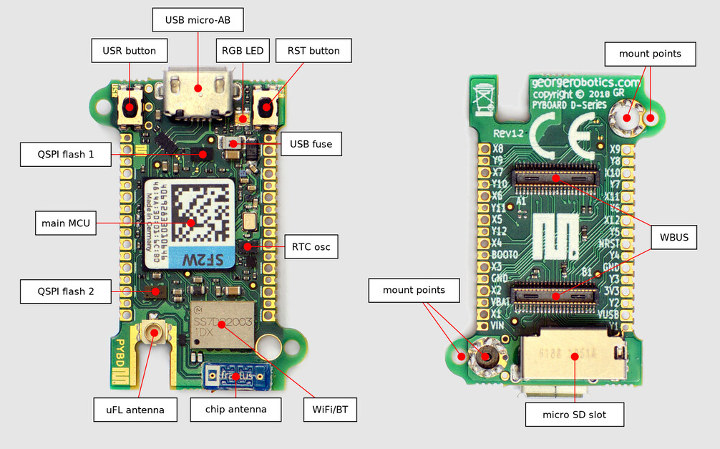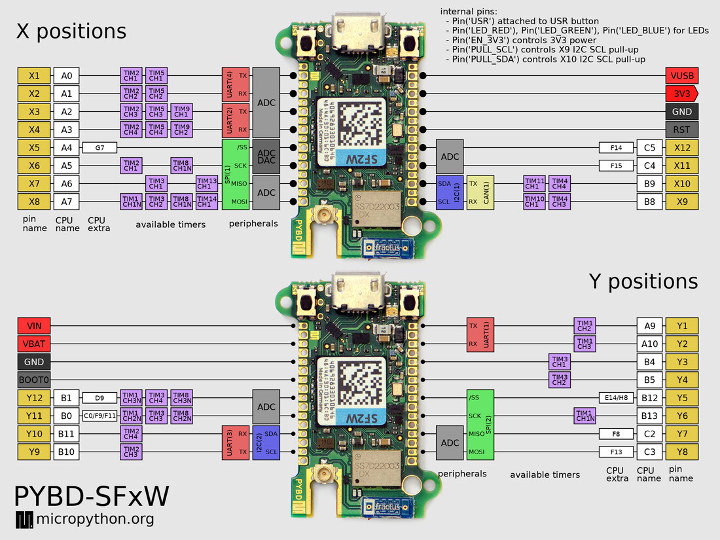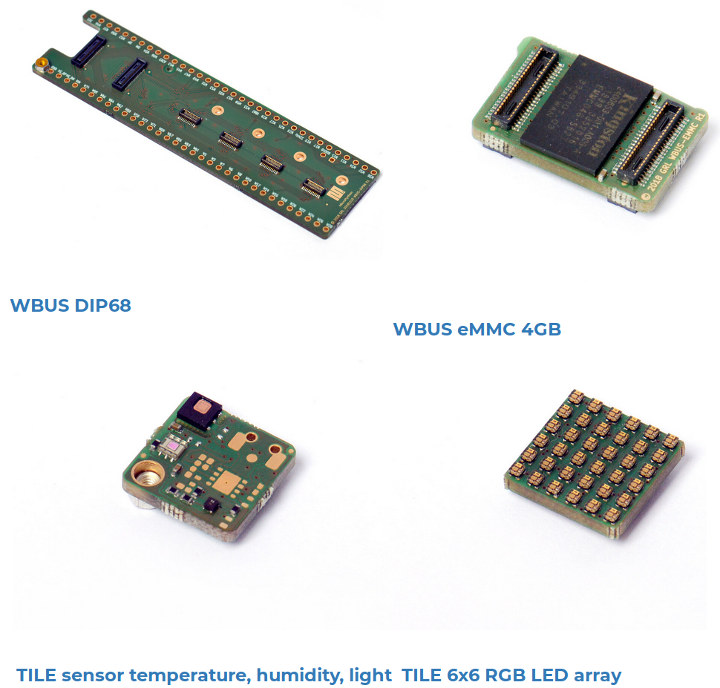We’ve already mentioned the latest Pyboard D-series board at the beginning of February after it was introduced at FOSDEM 2019. The board comes with a powerful STM32F7 Arm Cortex-M7 microcontroller, as well as a WiFi and Bluetooth wireless module.
The news is that the board has now launched for £43.80 in.c VAT ($56) and up. A better price comparison with other boards is normally achieved by comparing the ex. VAT price of £36.50 or about $48. That may still feel a bit pricey to some, but there was enough interest to snatch all available “PYBD-SF2-W4F2” boards, and this specific board is out of stock at the time of writing. However, there are multiple variants of the board and PYBD-SF3-W4F2 is still in stock for £58.20 inc. VAT (~$76.5).

We’ve now got the full Pyboard D-series “PYBD-SF2-W4F2” specifications:
- MCU – STMicro STM32F722IEK Arm Cortex M7 microcontroller at 216 MHz with 256KB RAM, 512KB flash, single precision FPU
- Storage
- micro SD card slot
- 2 MiB external QSPI flash with execute capabilities
- 2 MiB external QSPI flash for user filesystem and storage
- Connectivity – Murata 1DX WiFi & Bluetooth 4.1 dual mode module with on-board antenna and u.FL antenna connector
- USB – 1x micro USB port for power, flash disk access, and USB to serial debugging/programming
- Expansion
- 2.54mm pitch through holes for 16x GPIOs + 1.27mm pitch castellated and through holes for 32x GPIOs including 3x 12-bit ADC, 2x 12-bit DAC, 2x I2C, 4x UART, 3x SPI, 1x CAN interface
- 2x 40-pin WBUS connectors for a total of 59 GPIOs
- Misc – User and reset buttons, RGB LED, clock, real-time clock (RTC)
- Power Supply
- 5V via micro USB port
- On-board 3.3V LDO voltage regulator to supply main microcontroller
- Additional, user switchable, on-board 3.3V LDO voltage regulator to power SD card and external components
- Dimensions – 33.5 x 23.8 mm

PYBD-SF3-W4F2 differs with the MCU, namely STM32F723IEK which brings out a high speed USB PHY to the board. Finally, there’s also PYBD-SF6-W4F2 which features STM32F767VIT MCU with more built-in memory (512KB) and storage (2048KB).
The board can be programmed in Windows, Linux, or Mac OS using one of four methods:
- REPL – Connecting to your PC via USB, the board appears as a USB virtual comms port (CDC VCP) and you can use any serial program to connect and get a Python REPL prompt to type and execute Python commands on the fly.
- Remote script (aka raw REPL mode) – This mode can be entered by sending ctrl-A, and allows you to send and run a Python script to the board.
- From file – The pyboard can also appears as a USB flash drive in your PC allowing you to easily copy Python scripts to the board. main.py file will execute automatically at boot time.
- Via frozen code – More traditional and optimized way, as you need to recompile the C-based firmware. This method gives minimal overhead for RAM usage and start-up time, but it’s a bit harder to get started.
Documentation can be found here, and PDF schematics there. You’ll also find various WBUS compatible baseboards, accessories, and tiles (add-on boards) as you browse the store linked in the introduction.
Thanks to Lloyd for the tip

Jean-Luc started CNX Software in 2010 as a part-time endeavor, before quitting his job as a software engineering manager, and starting to write daily news, and reviews full time later in 2011.
Support CNX Software! Donate via cryptocurrencies, become a Patron on Patreon, or purchase goods on Amazon or Aliexpress






At this price I’ll pass. The Nucleo-767ZI has dedicated Ethernet and USB ports and the STM32F767ZI micro. At 25USD it is a much more affordable alternative
I had last year Wemos ESP32 boards with micropython shipped by default for 4eur. They retired the model, but now the new boards are around 6eur. What else?